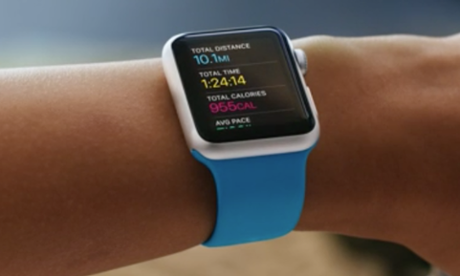
Front and centre of Apple’s pitch for its new Watch is the device’s ability to monitor its wearer’s health and fitness.
The device ships with a heart rate monitor and accelerometer, which it uses to calculate general fitness. It can augment that info by pairing with an iPhone, gathering data from GPS satellites and Wi-Fi networks to determine where in the world it is.
Out of the box, that data will be ploughed into two apps developed by Apple: Activity and Workout. The latter is dedicated to heavy exercise sessions, letting its user track the intensity of a visit to the gym or a jog around the neighbourhood.
Activity is a more passive service, tracking stats such as how much its user moves throughout a working day and whether they have at least a minute of activity an hour for 12 hours. Both apps will work in conjunction with the Health app and HealthKit framework, announced by Apple for inclusion in the forthcoming iOS 8 operating system, released on 17 September.
But as tech firms including Apple hoover up increasingly intimate data, the value of plausible privacy policies grows. Throughout the company’s event at the Flint Center in Cupertino, small barbs were delivered in the direction of arch-rival Google.
For example, when demonstrating Apple Pay, a new digital wallet service, the company’s head of software, Eddy Cue noted that the company is “not in the business of collecting your data” and promised that the service will not store information about where users spend their money, what they bought or any other details.
Much of the value of health data lies in it being shared and Apple will have its sights set on the $3tn (£1.85tr) US healthcare industry. As well as dozens of US partners, Apple has already demonstrated its HealthKit service with Cambridge University Hospitals. One of the big questions facing the NHS as a whole is whether or not the information collected by health apps will be welcomed by the service or viewed as yet another burden, as the worried well head for the GP with data they think indicates that they have some alarming disease or condition.
Heart rates and sleep patterns are easily monitored by a smartphone. Many tests that can be done at home using kits to analyse urine or blood – for instance to monitor the condition of people with diabetes – can be linked to an iPhone for analysis and storage of the data. The iPhone owner could keep a fairly comprehensive profile of their physical health, find out how their lifestyle is affecting it on a daily basis and do something about it – more exercise, fewer calories, for instance.
It is fairly clear that this sort of exercise has value in the US, where healthcare can cost the individual a lot of money. Their iPhone may alert them when there is a real need to see a doctor. How this plays out in the NHS, where healthcare is still free at the point of delivery is another question. Those most likely to afford the latest iPhone are not the demographic that fails to go to the doctor when they should.
The technology could, however, be very useful for the NHS if doctors can hand it out to those who have chronic diseases, such as heart conditions or type 2 diabetes, and who are less able to get to the doctor’s surgery, or to elderly patients who are better off in their own homes than in care homes or hospital. The problem may be – certainly in the case of the elderly – unfamiliarity with modern gadgetry. But one can envisage a wearable device programmed to send information to a hospital without the user having to so much as touch a screen.
Cambridge University Hospitals NHS Trust is interested in what Apple technology could offer. Together with Mount Sinai hospital in New York, it has been named as a consultant in the development of Apple’s health apps. It is also a leader in the UK in its development of electronic patient records: it is keen to press ahead where others have dragged their feet over patient confidentiality.
Addenbrookes, the trust’s flagship hospital, is testing electronic patient record apps on an iPod touch in its wards.
“As part of the roll-out of the Epic Electronic Patient Record system, our nurses will be using Apple iPod touch devices,” said a spokesman. “This will allow them to record patient observations, and undertake drug administration and ordering at the bedside. In addition we are using the two Epic apps, Haiku and Canto, which can be downloaded from the Apple store by our clinicians to access patient information. In the future we will also be working with Apple and healthcare technology companies to develop applications for clinical, operational and educational purposes.”
So Apple technology is useful within the NHS – but there is no suggestion that data from patients’ iPhones will be welcomed. At least, not yet.

